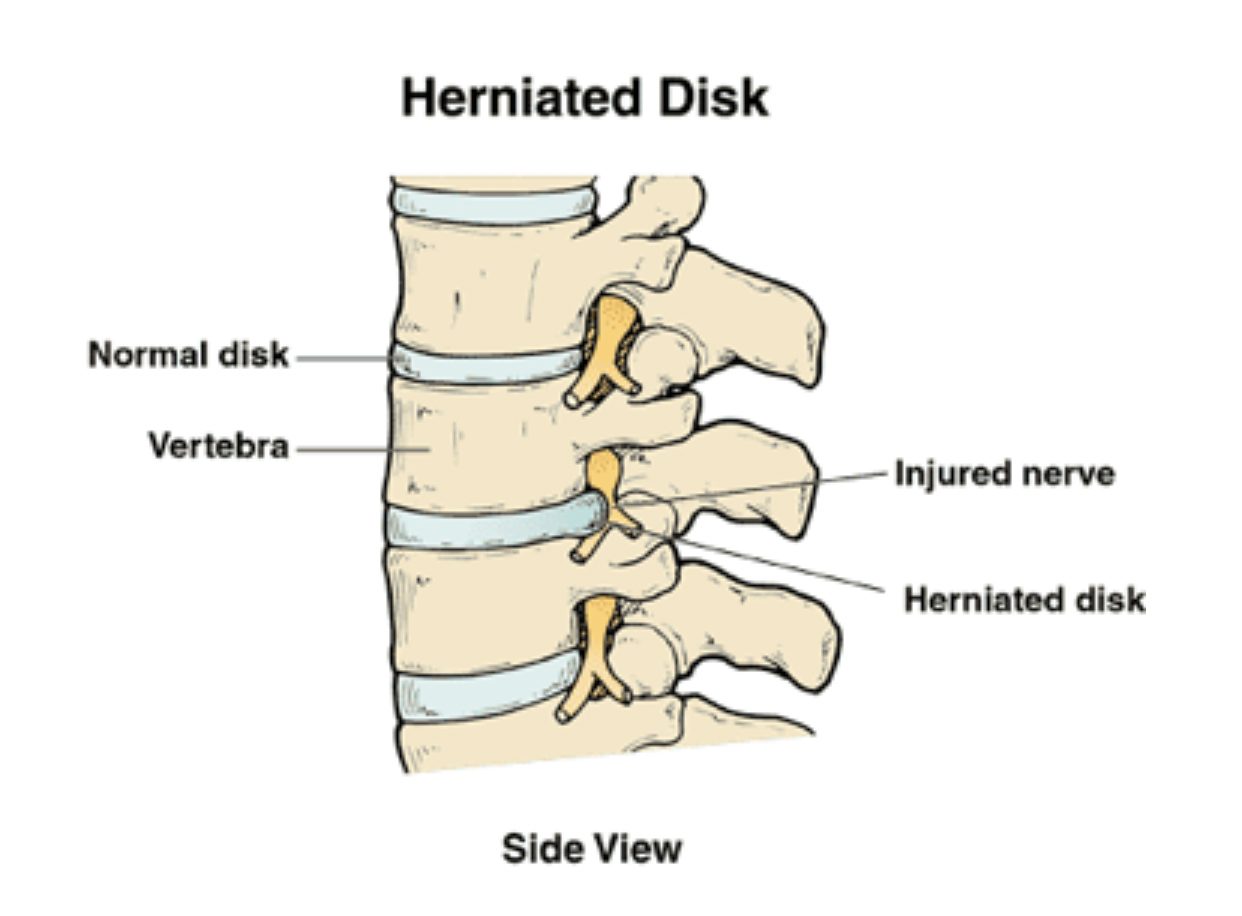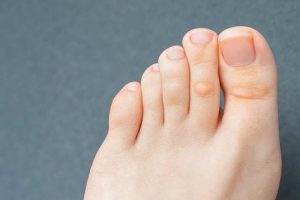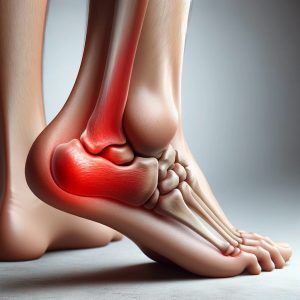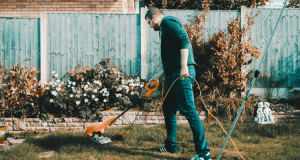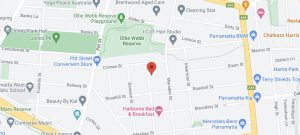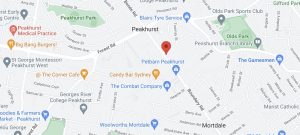A herniated disk is a disk where the inside soft part of the disk has seeped out from its proper place through the tougher outer part of the disk. Disks are small, circular cushions between the bones of the spine (vertebrae). The outside is firm and ligamentous, the inside is soft and gelatinous. Normally, discs act as shock absorbers to cushion your vertebrae from each other as you move. A herniated disk may press on nearby nerves and cause severe pain.
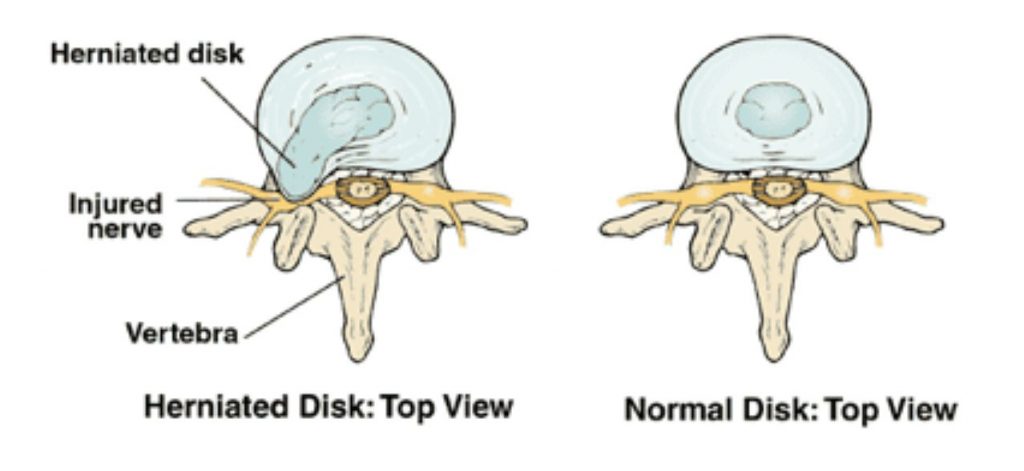
When a disk is damaged, the soft gooey centre of the disk squeezes out through a weak point in the firmer outer layer. A disk may be damaged by:
- a fall or accident
- repeated straining of your back
- a sudden strenuous activities such as lifting a heavyweight incorrectly or twisting violently
A herniated disk may also happen spontaneously without any specific injury.
What are herniated disk symptoms?
If your herniated disk is in your back, your symptoms may develop gradually or begin suddenly. Symptoms may include:
- back pain
- numbness, tingling, pain, or weakness in one or both legs (this is called sciatica)
- changes in bladder and bowel habits.
Symptoms of a herniated disk in your neck may also develop gradually or suddenly. You may wake up and feel a sudden aching. Or you may have a twisted neck that you cannot straighten without extreme pain. You may also have numbness, tingling, or weakness in one or both arms.
How are herniated disks diagnosed?
A Practitioner will review your symptoms and ask about the history of your pain. Then they will examine your spine and test the movement and reflexes in your arms and legs. Some other testing may be beneficial
- x-rays of your spine
- magnetic resonance imaging (MRI)
- CT scan
Please be aware, that just because a scan indicates that there is a disk herniation, it DOES NOT always mean that the herniation is the cause of your pain. There are people walking around with massive herniations in no pain at all. And similarly, there are people walking around with very minor disks bulging with huge amounts of pain. We diagnose and treat the person, not the scans!
How are herniated disks treated?
In most cases, treatment without surgery will relieve your pain.
For a herniated disk in your back, a practitioner may recommend:
- Deep tissue release to areas above and below the herniation
- Gentle and focused spinal adjustments may help take the mechanical loading that underpin the herniation
- Effective anti-inflammatory and tissue repair support
- Nutrition for structural health
- Eventually, we will need to strengthen your torso and back within the whole body system
As your pain lessens, the practitioner will want you to begin a program in which you will do exercises to strengthen your back muscles and joints. These exercises should safely and incrementally load your back muscles so that they can get stronger.
How long will the effects of a herniated disk last?
That depends on the size of the herniation and if it is the actual cause of pain.
The initial intense pain should go away within 4-6 weeks, but some pain may remain for a few months. You may be prone to backaches throughout your life and therefore must remember to protect your spine by encouraging good movement and increased strength.
If the weakness and numbness in your legs continue for 6 months or longer or if you lose control of your bowel or bladder function, the practitioner will need to refer you to a spinal specialist as soon as possible.
How can I take care of myself?
Practice correct posture when you are walking, sitting, standing, lying down, or working.
- When lifting heavy objects, squat down by the object, while keeping your back as straight as possible, but pivoting forward through your hips. Use your leg and hip muscles to do the lifting. Avoid twisting.
- Use a valsalva maneuver when lifting. You do this by taking a sharp, half breath out and holding that torso tension throughout the whole lift.
- When you sit, have your feet flat on the floor. Get up every 20 minutes or so and stretch. Sit in a chair that has good back support.
- Sleeping on a firm mattress is recommended for about 70% of people. Lie on your side (never on your stomach) with your knees bent or on your back with a small pillow under your head and another good pillow under your knees.
When can I return to my sport or activity?
The goal of rehabilitation is to return you to your sport or activity as soon as is safely possible. If you return too soon you may worsen your injury, which could lead to permanent damage. Everyone recovers from an injury at a different rate. Return to your sport will be determined by how soon your herniated disk recovers, not by how many days or weeks it has been since your injury occurred. In general, the longer you have symptoms before you start treatment, the longer it will take to get better.
It is important that your herniated disk has fully recovered before you return to any strenuous activity. You must be able to perform all of your full body exercises without pain. You must have full, pain-free range of motion of your back.
What can be done to help prevent a herniated disk?
Herniated disks can often be prevented by keeping your weight down, eating a proper diet, and training to keep your body strong. Strong, supple muscles can stabilize your spine and protect it from injury. This includes keeping not only your torso muscles strong but the whole body. Walking and swimming are two good exercises for the movement of the spine. Squatting correctly may also help strengthen the spine.
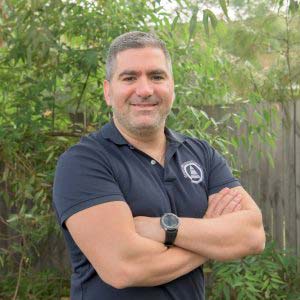
Dr. Sami Karam, Osteopath
I’ve been a qualified Osteopath since 2004. I’ve been playing football ever since I could remember and I have a passion for it. I’ve played at the highest level in the NSW State League at both Youth and Senior levels, and have also been Head Physician at numerous State League Clubs. I’ve travelled internationally and consulted with Sports academies in Barcelona and Italy. I have a special interest in Strength and Conditioning for footballers, as I believe it gives them an edge in their physical competition. My passion involves bringing all of this knowledge into every single treatment that I provide for all athletes. If you feel that I can help you and want to reach out to me, contact me.

